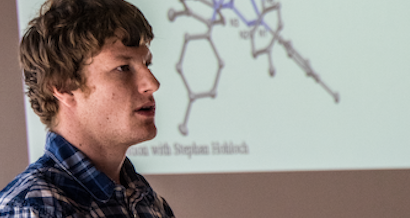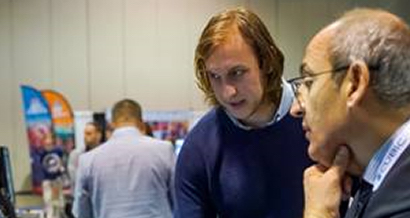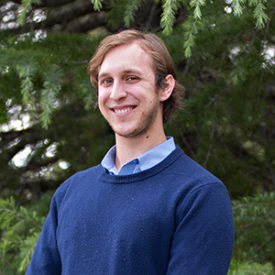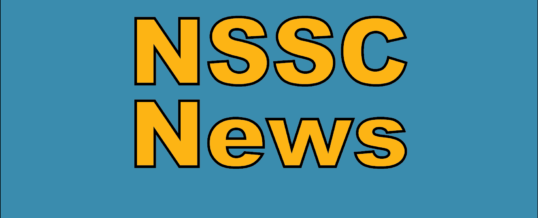In 2017, radiochemistry graduate student Mark Straub left the comfortable academic environs of UC Berkeley to move to the middle of New Mexico, where he would spend his summer vacation working full time at Los Alamos National Laboratory (LANL), the birthplace of the Manhattan Project. There, Straub teamed up with LANL scientists Jaqueline Kiplinger and Julianna Fessenden to study the impact and evolution of nuclear forensics, a process in which nuclear material can be examined to determine its source and history.
Straub’s dedication to this project continued following the completion of his summer internship, spurring a multi-year collaborative effort between UC Berkeley and LANL. With his advisor, Prof. John Arnold, and his LANL mentors, Straub prepared a review article, “Recent Advances in Nuclear Forensic Chemistry”, will be featured as the cover article in a special issue of Analytical Chemistry next month.
Above: Mark Straub at work in the Chemistry Lab.
Nuclear forensics research is critical to national security, as rapid chemical analysis of seized radioactive material is imperative to prevent the construction and detonation of an illicit nuclear weapon. Within the past decade, advancements in chemistry and nanoscience have revolutionized the capabilities accessible to nuclear forensic chemists, enabling complex analysis of samples that would previously be considered undetectable. New case studies using fallout from the Trinity Test Site and the Hiroshima detonation site have redefined the paradigm for real-world nuclear forensic analysis, and specialized materials have been synthesized as fallout surrogates and radionuclide traps. This review of nuclear forensics highlights new compounds and materials, recent case studies, and state-of-the-art capabilities for pre- and post-detonation nuclear forensics and environmental monitoring within the last ten years.
This project began at the NSSC-LANL Robert Keepin Nonproliferation Science Summer Program, where Mark spent the summer interviewing experts in nuclear forensics and touring the laboratory facilities where this research takes place. This summer program is a component of the prestigious Nuclear Science and Security Consortium (NSSC) fellowship, an opportunity made available by the National Nuclear Security Administration through a $25M award to UC Berkeley. The NSSC, led by Prof. Jasmina Vujic in the Department of Nuclear Engineering, trains the next generation of nuclear scientists and engineers while engaging in research and development that supports the nation’s nuclear security and nonproliferation mission. All NSSC fellows are connected with a mentor at a US DOE National Laboratory that the students work with throughout their academic careers. The NSSC also organizes summer programs and projects that allow students to work on-site at the National Laboratories. With continued support from the NSSC, the authors included perspectives on nuclear forensics from academic researchers, government scientists, and nuclear policy specialists.
As nuclear globalization increases, the field of nuclear forensics will become an increasingly critical component of national security. These UC Berkeley and LANL scientists continue to contribute to advances in this field, with multiple projects in nuclear forensics and actinide chemistry. Mark Straub’s doctoral research focuses on developing new molecules and nanomaterials for nuclear forensics and energy applications, and Prof. John Arnold leads the NSSC program in radiochemistry, with dozens of publications in actinide chemistry. Jaqueline Kiplinger studies molecular transformations of the actinide elements, investigating new processes for catalysis and nuclear forensics. Julianna Fessenden is the United States leader for device assessment post-detonation forensics, a prestigious post. These scientists are devoted to making new advances in this important area of research. To learn more about this exciting field, read “Recent Advances in Nuclear Forensic Chemistry” here.
DEC




